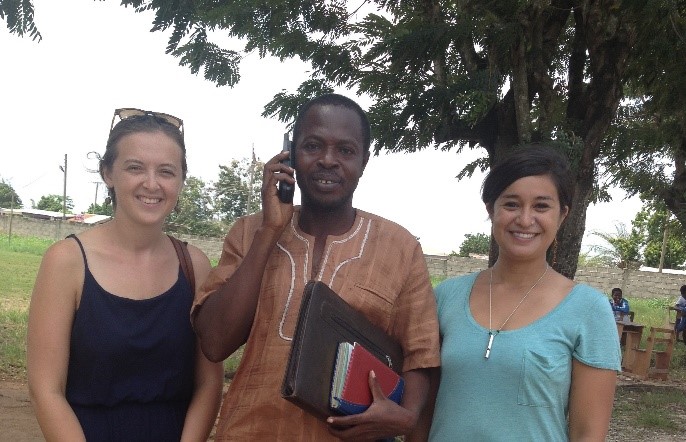Second in a series by Isabel Hovey (LBJ MGPS Student) covering her internship at Exponential Education.
This summer, I went to Ghana to complete an internship an education non-profit. While I was there I conducted an external evaluation of participant experiences for Exponential Education’s programs. The majority of my time in the field was dedicated to data collection, sometimes through interviews. I expected the task to be straightforward – determine who I wanted to interview, schedule the meeting, and conduct the interview – but I quickly learned otherwise.
I have since discovered that conducting an interview is an exercise rooted in humor, creativity, and attention to detail. While I acknowledge that my method is country specific, I hope that my method of collecting data in the field will offer new researchers a glimpse into the patience needed to do this type of work. Therefore, here is my 15 Step Method for conducting a twenty minute interview in Ghana.
#1 Print an official letter of introduction explaining the purpose for the meeting two days in advance. It should be noted that the mere task of writing and printing any document can sometimes take a day or two due to the unpredictable country-wide power outages, more commonly known as “dumsor-dumsor.”
#2 Get a referral from someone with an established relationship with the interviewee. A personal introduction increases the likelihood for a warmer reception.
#3 Meet with the referral so they can sign the official letter of introduction.
#4 Attempt to call the potential interviewee with the referral. Sometimes, a meeting can be scheduled on the phone but . . .
#5 Usually not. In that event, travel with the referral by tro-tro to the interviewee’s office and try to meet with him or her to set up a later time for the real interview.
- Tro-tro (n): Public transportation, in the form of large passenger vans
- Tro-tros do not run on set schedules and are instead largely dependent on how quickly the seats filled. A typical trip may include a two kilometer walk, waving down a passing tro-tro, arriving at a designated terminal, finding the next tro-tro, waiting for it to fill, travel in a high traffic area, and another short walk to the designated meeting place or office.
- While English is understood by most, it is preferable and better received if all questions and requests during your trip are conducted in the local Twi language. Therefore, when possible, learn language basics wherever you plan to do data collection OR include the cost of a translator in your research budget whose sole responsibility is to get you from point A to point B.
#6 IF you are able to make contact with the interviewee on this initial trip, exchange formal introductions and present the official letter of introduction.
#7 IF you are successful in scheduling a meeting, take the interviewee’s phone number and promise to return in a few days.
#8 On the morning of the scheduled interview, call the interviewee early in the morning to confirm the schedule. Unlike the directness found in American business phone etiquette, Ghanaian phone conversations should begin with a “Hello, how are you. I am fine,” and all requests or questions should begin with “Please.”
#9 Once the interviewee confirms IF he or she is still available, prepare for travel. Note: I include the official letter of introduction and referral if this is the first contact.
#10 Dress professionally. A well-ironed, tailor-made clothes in Ghanaian fabrics is particularly well-received. Needless to say, there will not be many moments in the future where you can wear a bright orange dress printed with blue birds to a business meeting (a welcome alternative to the usual grey suit).
#11 Get to the meeting. See #8. Because you probably won’t have a car, allow for ample travel time, sometimes up to three hours before the scheduled appointment for a trip that might otherwise take 45 minutes in a private car.
#12 Play the waiting game. Arrive fifteen minutes before the meeting was scheduled. Hope that the interviewee is available to start the meeting on time. Most of the time, you’ll have to wait for thirty minutes to an hour for the interviewee to become available. Note: School officials must often address unscheduled events that require immediate attention.
#13 Begin the interview. The interview itself usually begins with light conversation, never business first.
#14 Conduct the interview. The actual recorded interview should last twenty minutes. Despite the regular challenges of background noise (i.e., children playing, loud music), the interviews usually go well. Every school official I spoke with was kind, professional, and communicative.
#15 Catch a tro-tro home. The return trip might last several hours, especially if it happens to coincide with rush-hour traffic and all of the traffic lights are no longer functioning from dumsor-dumsor power outages. Fortunately, small snacks to pass the time like fried plantains or sugar cane can usually be purchased from atop a vendor’s head through the tro-tro window.
An actual twenty minute interview under an hour might feasible in a world with infinite internet access, electricity, and a firm grasp of cultural idiosyncrasies. But in the field, there is no possible way to ensure any of these things.
Edited by Marcos Duran

